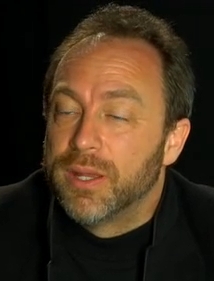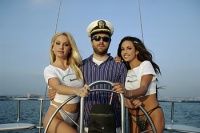Difference between revisions of "Criticism of Jimmy Wales"
(→Flip-flopping on paid editing of Wikipedia: GFDL to CC) |
|||
| Line 35: | Line 35: | ||
However, just a couple of months later in October 2006, Wales would renege on this agreement and, in fact, chastised anyone in the public relations industry as "[http://blog.bitepr.com/2006/08/jimmy_wales_on_.html deeply unethical]" if they attempt to create or influence GFDL content of an encyclopedic nature. Of course, the GFDL specifically bars licensees from restricting content to either commercial or non-commercial parties, so Wales really had no clue here. | However, just a couple of months later in October 2006, Wales would renege on this agreement and, in fact, chastised anyone in the public relations industry as "[http://blog.bitepr.com/2006/08/jimmy_wales_on_.html deeply unethical]" if they attempt to create or influence GFDL content of an encyclopedic nature. Of course, the GFDL specifically bars licensees from restricting content to either commercial or non-commercial parties, so Wales really had no clue here. | ||
| + | |||
| + | Then in 2009, Wales led the charge to replace Wikipedia's GFDL license with a Creative Commons license, despite the fact that 10% of GFDL contributors expressly forbade their content from being converted. | ||
==Essjay scandal== | ==Essjay scandal== | ||
Revision as of 23:11, 15 September 2016
Wikipedia co-founder Jimmy "Jimbo" Wales has often been criticized for his sometimes authoritarian, sometimes unaccountable, and sometimes inept style in his direction of the online encyclopedia community and for his mismanagement of the Wikimedia Foundation that is responsible for running it.
As a New York Times writer commented in a column once:
- "As long as he is involved with Wikipedia, however, Mr. Wales will continue to be a guiding light for its many contributors — as well as a lightning rod for its critics." [1]
As a Wikipedia administrator with over 125,000 edits on the project has said:
- It is a sad, sad statement on the Wikipedia community that it has never gotten rid of Jimbo Wales. It's remarkable to me that now, in 2010, Jimbo is still around, while the project itself is stagnating quite badly. I thought at one time that such a vibrant project with so much potential would surely jettison Jimbo -- who is so obviously a useless and unprincipled opportunist -- in relatively short order, once it matured to a certain point. Instead I'm starting to wonder if the project will sink and Jimbo will still be sitting there when it does. [2]
Show him the money
Jimmy Wales isn’t paid to actually figure things out. He’s paid approximately $10,000 to $40,000 per speech (by organizations like Alfresco Summit, IP Expo, and the government of the United Arab Emirates) to stand up in front of large audiences and utter things that he believes to be true. He often re-uses and re-purposes previous PowerPoint decks that he's presented before. Because he had a small role in co-founding Wikipedia (which he then aggrandized into a much larger role, after the fact), he earns a certain mystique as the idea-man behind "the sum of human knowledge". But when you get down to watching Jimmy Wales actually trying to figure things out, such as with a business, the landscape is littered with his failures. Bomis didn’t work out, even though it was an Internet leader in its time. Openserving failed. Wikia Search had the plug pulled on it without warning. CiviliNation was a failure, as was Impossible.com – two “do good” ventures that Wales backed, only to watch them run into the ground financially. As of late 2014, he’s doing the most serious business of his career, with a £20 million IPO on wireless phone company, The People’s Operator (now called TPO Mobile). He has already burned through most of that company’s IPO cash, and the firm is losing £7.22 for every £1.00 of revenue taken in. Its stock price has depreciated an astounding 87%.
It really is a wonder why any organization (or journalist) actually pays any attention to Jimmy Wales. He exudes altruism, but in the background, he’s just making sure he gets paid. (E.g., even as TPO is losing investors' money hand over fist, Wales' £250,000 annual salary is not at risk.)
Not a pornographer?
Jimbo Wales made repeated edits to his own biography on Wikipedia. One particularly hard bone of contention was Bomis, Jimbo's thriving Internet venture prior to Wikipedia. Bomis, a search portal, also included a healthy dose of "adult content", which Jimbo previously downplayed as glamour photography -- though as The New Yorker notes, "glamour photography" is "not the most precise way to describe lesbian strip-poker threesomes." Nonetheless, Jimbo has been steadfast in his efforts to remove any suggestion that the beacon of free culture was at one time an unapologetic pornography peddler.
"Sole Founder" controversy with Larry Sanger
While the Wikipedia project consistently released statements to the press in its earliest years describing Larry Sanger as the "co-founder" of the encyclopedia, Jimmy Wales later took it upon himself to reframe the description of Sanger as an "employee" of Wales'. Wales has stated that he appreciates Sanger's contributions, but he seems unwilling to accept Sanger as a pioneer of Wikipedia's construction.
Dr. Sanger has taken the time to elaborate on the factual evidence that supports his identification as "co-founder" of Wikipedia. Jimmy Wales has done very little such work to compile evidence that he is the "sole founder".[3]
More recently, Sanger has called out Wales via an "open letter",[4] where the displeased creator of the Wikipedia name and architecture accuses Wales of "lies and distortions", being "transparently self-serving", and issuing "particularly outrageous" claims.
Clearly, the facts remain:
- Larry Sanger came to Wales in January 2001, asking him to install wiki software to feed the Nupedia encyclopedia project.
- Sanger named this new feeder project "Wikipedia".
- Sanger issued the first invitation for the public to come help build Wikipedia.
- Sanger, not Wales, crafted most of the key guidelines and policies that still govern Wikipedia today.
- Data dumps of the earliest months of Wikipedia show that Sanger contributed content about 7 times more often than Wales did.
Flip-flopping on paid editing of Wikipedia
In August 2006, Wales crafted a compromise with a paid-editing firm to create and serve freely-licensed (GFDL) content on their own website about paying entities not currently featured in Wikipedia. Other unpaid, independent editors could determine whether the material was worth scraping into Wikipedia.
However, just a couple of months later in October 2006, Wales would renege on this agreement and, in fact, chastised anyone in the public relations industry as "deeply unethical" if they attempt to create or influence GFDL content of an encyclopedic nature. Of course, the GFDL specifically bars licensees from restricting content to either commercial or non-commercial parties, so Wales really had no clue here.
Then in 2009, Wales led the charge to replace Wikipedia's GFDL license with a Creative Commons license, despite the fact that 10% of GFDL contributors expressly forbade their content from being converted.
Essjay scandal
In January 2007, Wales hired Ryan Jordan (pseudonymously known as "Essjay" on Wikipedia) to work at Wikia, Inc. At that time, it is known that Wikia's co-founders knew that Jordan was not academically credentialed as a Theology professor holding a PhD, as described on his Wikipedia user page. In fact, he was a 24-year-old college dropout. Regardless of this fraud, later in February, Wales appointed Essjay to Wikipedia's Arbitration Committee, the highest authority on Wikipedia short of the Wikimedia Foundation's own board of directors and staff. When the Wikipedia Review engaged the New Yorker magazine to expose Essjay's fraud, Wales' first reaction was to say he "didn't really have a problem with it".
Well after the scandal evolved into a serious public relations threat to Wikipedia's credibility, Wales sought to deflect responsibility for the whole affair by blaming the Arbitration Committee that he himself had created: "EssJay was appointed at the request of and unanimous support of the ArbCom." - Jimmy Wales 17 October 2007. Perplexed members of the Arbitration Committee responded by saying it would be more accurate to describe their "unanimous support" as "nobody objected to Jimbo's nomination of Essjay".
Spyware? What spyware?
Jimbo must have some fond connection with a piece of hated software called BonziBUDDY, because Jimbo has no problem stepping in personally on this Wikipedia subject. Those Internet veterans among you may remember BonziBUDDY, that obnoxious purple gorilla whose friendly and helpful appearance just happened to hide a program designed to infest your computer with truckloads of adware and malware. The mainstream media was virtually unanimous in scorning BonziBUDDY on various "most hated" lists. Jimbo, however, had a curiously different opinion; in fact, he couldn't keep this opinion to himself, so he personally edited Wikipedia's BonziBUDDY article to systematically erase mention of "spyware" from the article. In fact, Jimbo also violated the Wikipedia rule against "original research" by becoming an expert paralegal for a moment: "In the following legal settlement, the issue was not the issue of "spyware", a term which does not appear in any of the legal documents."
Rachel Marsden affair
His alleged attempts to "clean up" a Wikipedia entry for a woman with whom he had a relationship has also generated headlines. Wales was accused of intervening to sanitize the Wikipedia article of a news commentator with whom he was having a romantic online relationship, which was about to culminate in a sexual romp in a Doubletree Hotel in the nation's capital.
The Wikipedia article regarding controversial Canadian radio commentator Rachel Marsden had been the subject of controversy on Wikipedia for some years. According to Marsden, she had asked Wikipedia to delete her biography. Her concerns led her to contact Wikipedia co-founder Jimmy Wales, claiming that it was incorrect and libelous. Wales reviewed her biography and, deeming that it was not up to standard, helped to clean up the entry by quietly requesting that a closely allied administrator do the work, literally hours before Wales would meet Marsden in person at the hotel.
Wales announced in a statement on Wikipedia "My involvement in cases like this is completely routine, and I am proud of it."[5] On February 29, 2008, the technology gossip blog Valleywag claimed that they had entered into a relationship, and published instant messaging chats that they had allegedly exchanged. On the following day Wales announced on his Wikipedia user page that he was no longer involved with Marsden. In return, Marsden, who claimed to have learned about the breakup by reading about it on the Internet, turned to eBay and put up for auction a t-shirt and sweater that she claimed to be Wales'.[6][7][8][9][5] [10][11]
There is curiously only a brief mention of this episode in the anonymous-edit-protected Wikipedia article about Jimmy Wales, even though it was the talk of mainstream media for the better part of March 2008. Compare, there is an entire article about Mel Gibson's DUI incident; an article which any anonymous IP address can edit and malign. Not so, Jimmy Wales' article. He merits special protective editorial favors, it would appear.
In filing for divorce from Jimmy, his second wife Christine A. Wales was represented by attorney Sean A. Costis. Mr. Wales was represented by John Thacker. The case brought before the court in Pinellas County, Florida in October 2010 was ruled on by Circuit Judge Jack Helinger in April 2011.
Misspending Foundation funds
In March 2008, Wales was accused by former Wikimedia Foundation employee Danny Wool of subsidizing personal expenditures with foundation funds. These included rebuffed attempts to have reimbursed a $1200 dinner for four, a $650 wine tab, and even a visit to a Moscow massage parlor that Wales submitted twice for payback from the Foundation. Wool also stated that Wales had his Wikimedia credit card taken away in part because of his spending habits, though Wales denied this claim.[12] Foundation Chair Florence Devouard and former foundation interim Executive Director Brad Patrick denied any wrongdoing by Wales or the foundation, saying that Wales accounted for every expense and that for items he did not have receipts for, he paid out of his own pocket.[13] Executive Director Sue Gardner would later defend Wales on CNET video, saying, "Jimmy has never done anything wrong."[14]
If these facts are not enough to convince you that money makes its way through the back door to Wales' wallet, then perhaps a look at the front door is in order. The Wikimedia Foundation announced in January 2009 that it was to begin paying rent to Jimmy Wales' company, Wikia, Inc., on a monthly basis. They would use the tax-advantaged funds granted by the Ruth and Frank Stanton Fund. Did Wikia offer the lowest-priced rent solution to the Wikimedia Foundation? Not at all! After a frantic back-and-forth attempt by different agents of the Wikimedia Foundation to explain how this level of self-dealing was allowed to happen, Wikia's CEO Gil Penchina finally revealed (a year later, January 4, 2010) in a personal e-mail:
They [the Wikimedia Foundation] approached us and asked if they could rent space on a temporary basis.. and I think it ended up being 4-6 months give or take. I thought about giving it to them for free and I wasn't sure which was worse... getting accused of bribing a non-profit for giving it away, or getting accused of stealing for a non-profit for charging... so we ended up asking them to get competitng (sic) quotes from other landlords so that THEY could feel comfortable with the decision.
First there is a request to rent space from a hand-picked bidder, and only then a suggestion to get competing bids from other landlords? It sounds like someone at the Wikimedia Foundation wanted to make sure that Jimmy Wales' for-profit company had the inside track on that bid, worth many thousands of dollars.
Jeffrey Merkey favors-for-payment allegations
Later in March 2008, it was alleged by Jeffrey Vernon Merkey that Wales had edited Merkey's entry in Wikipedia to make it more "favourable" in return for donations to the Wikimedia Foundation. In May 2006 Wales had erased Merkey's article "because of the unpleasantness of it" and stated "we are nearing a resolution of this longstanding conflict," referring to a dispute between the Wikipedia community and Merkey over the content of the biography. Wales called the allegation that the Wikimedia Foundation had received donations in exchange for this "nonsense."[15] [16] Nonetheless, Merkey made a very clear and very deliberate statement to the Associated Press that attested:
Wales agreed that in exchange for a substantial donation and other financial support of the Wikimedia Foundation projects, Wales would use his influence to make Merkey's article adhere to Wikipedia's stated policies with regard to internet libel "as a courtesty" and place Merkey under his "special protection" as an editor.[17]
A few news sources that reported the story provided the link to the article's history to show Jimbo edited the article, except if one is to hit "edit history" he will see nothing. The page was deleted from Wikipedia in May 2010. Still the page's log from October 2006 "(investigating new edits for possible violations of WP:NOR, WP:RS, and WP:BIO [edit=autoconfirmed:move=autoconfirmed)" shows that Jimbo Wales protected the page just as Merkey said he did. The page reminded protected for almost two years. It is very unusual for an article of little importance. Also unusual is this exchange: Jimbo was asked about the article:
I have no clue whether or not I'm stepping into a landmine here...
I'm a brand new admin and in trying to clean up pages that have been "semi" protected, I ran across Jeff V. Merkey. From what I can tell, there seem to have been several bouts of COI, BLP, harassment, etc around the article. But most if not all of that seems to have happened last year (late 2006), so I was wondering if the page should still be protected, or if it can be unprotected. Since you protected it back in Oct. 2006, I bring it to you to decide :) -- SatyrTN (talk | contribs) 02:01, 10 December 2007 (UTC)
Jimbo responded:
I would recommend keeping it semi-protected for now. It could be unprotected at some point in the future.--Jimbo Wales (talk) 21:58, 10 December 2007 (UTC)
In 2009 Jimbo Wales was notified about the deletion request for the article as the article creator. This notification mean that Jimbo himself created the article that is very unusual and probably is yet another confirmation of the editing Wikipedia for donations. Jimbo removed this notification with the edit summary: "I prefer to have nothing to do with this at all".
Tolerance of plagiarism
The original version of any wiki-formatted article about the Arch Coal company was authored in September 2006 by Gregory Kohs and released under the terms of the GFDL on this website, MyWikiBiz.com. It was then scraped by an independent editor into Wikipedia. In October 2006, erroneously thinking that the article was paid for by Arch Coal, Wikipedia co-founder Jimmy Wales acted to delete the article from Wikipedia, but the Wikipedia community determined that Wales' action had been unjustified. The article was revised, largely by "User:JzG" (Guy Chapman), who would later claim that he wrote his version of the article ab initio, "from the ground up". However, in January 2008, Kohs demonstrated to Chapman that the article as modified by User:JzG actually plagiarized many aspects of the original. Faced with that evidence, Chapman elected to cover up his misdeed by deleting the original edits on the Wikipedia site, thus making the provenance of the article appear to have come from Chapman, and not from MyWikiBiz. When Jimmy Wales was notified about this violation of professional ethics and proper GFDL attribution of the edit history, Wales very reluctantly restored the original edit history, with the childish edit summary, "might as well restore all of it I suppose".
Additional comment
When in December 2008, Kohs sought to improve the article about Arch Coal on Wikipedia, his improvements were reverted back by a mindless administrator from Belgium. This underscores the true system of editorial control on Wikipedia -- it matters not the content of one's edits, but rather who authors the content. (Which, of course, directly contradicts Wikipedia's supposed credo that "anyone can edit".)
Jimbo (finally) sees the light
After about 26 months, Wales did ultimately apologize in a round-about way for his mistakes in handling this situation. Bravo! <golf clap>
Jimbo plagiarizes photography
When delivering an important presentation in Spain in 2010, Jimmy Wales featured an image that he (or his speech writer) had altered, mislabeled into the wrong decade, then presented as a "Wikia" product. He did not properly attribute the image to the original photographer, thus violating the CC-by-SA 2.0 Generic license by which the photo was released.
Openserving
In December 2006, Jimmy Wales launched a spin-off from Wikia called Openserving. Wales was attempting to copy another business model that had been floated by Centiare.com (which is currently regenerated at MyWikiBiz), and by Helium.com, where the unpaid labor who create new content would have the opportunity to earn advertising revenue as a reward for their authorship. Although Wales claimed that "thousands" of interested queries were made of Openserving, the project never got a single new forum off the ground. It was a failure.
Wikia.com is perhaps Wales' most successful project financially, although it has been speculated that it won't be able to turn a regular profit, as meager ad revenues can't possibly support the staffing needs.
Spanking Art Wikia
Jimmy Wales' privately-held Wikia company as recently as January 2008 hosted online a web menagerie of freely-licensed images of innocent children juxtaposed with depraved images of children being mercilessly spanked until purple, along with photos of various sexual-enhancement toys. A critic of the site led an urgent campaign that challenged this Spanking Art Wikia wiki. Wales became quite ruffled under the collar, irritated that the agitator had not "made a complaint through the proper channels". Imagine, sexually-charged images of deviant abuse against children, and the man hosting it on his company's servers was more upset that the complaints against his site weren't filed properly.
Wikia Search
Jimbo's venture into the search engine market was much-ballyhooed by the tech media, but after only an 18-month effort, Wales pulled the plug on the failure that was Wikia Search. Evidence was clear early on that it would not be a success. One award-winning technologist opined on the $50,000 cost of Wikia's purchase of Grub crawler technology, but Jimmy Wales had a succinct retort for Seth Finkelstein: "Seth, you're an idiot." But even as late as March 2009, Wales deceived reporter Susan Kuchinskas with the assurance, "I have my team focused on the front end, working on the user experience, and making sure we have all the wiki-like tools people need to work on the site. We're just cranking away." Merely days later, Wales would face reality, fire the people he'd employed to try to make this pig fly, and shut down the site.
Intolerant of criticism
Nobody really enjoys personal criticism, but one could argue that the "spiritual leader" of a global project that touches hundreds of millions of people should be more tolerant and receptive to critique. Not so, Jimmy Wales. When faced with direct criticism from even the most prolific of Wikipedia volunteers, it takes super-sensitive Jimbo only a few minutes to dismiss the concern as "trolling and attacks".
See also
- Wikipedia
- Wikimedia Foundation
- Nationalistic Editing on Wikipedia
- Wikipedia's bias towards Dictator Josip Broz Tito and Communist Yugoslavia
References
- ^ <templatestyles src="Module:Citation/CS1/styles.css"></templatestyles>""Open-Source Troubles in Wiki World"". Archived from the original on 2012-09-21., Noam Cohen, March 17, 2008.
- ^ <templatestyles src="Module:Citation/CS1/styles.css"></templatestyles>"User:Everyking". Archived from the original on 2012-09-21., August 31, 2010.
- ^ <templatestyles src="Module:Citation/CS1/styles.css"></templatestyles>"My role in Wikipedia (links)". Archived from the original on 2012-09-12., Dr. Larry Sanger, 2007, LarrySanger.org.
- ^ An open letter to Jimmy Wales, Dr. Larry Sanger, 2009, Citizendium.org. Template:Deadlink
- ^ a b Template:Cite news
- ^ Template:Cite news
- ^ Template:Cite news Template:Deadlink
- ^ Template:Cite news
- ^ Template:Cite news
- ^ Template:Cite news
- ^ Template:Cite news
- ^ <templatestyles src="Module:Citation/CS1/styles.css"></templatestyles>"Wikipedia's Jimmy Wales accused of expenses rort". Archived from the original on 2012-09-21., Asher Moses, March 5, 2008, Sydney Morning Herald
- ^ <templatestyles src="Module:Citation/CS1/styles.css"></templatestyles>"San Francisco Chronicle". Archived from the original on 2012-09-12.
- ^ <templatestyles src="Module:Citation/CS1/styles.css"></templatestyles>"CNET video of an extremely uncomfortable Sue Gardner". Archived from the original on 2012-09-21.
- ^ <templatestyles src="Module:Citation/CS1/styles.css"></templatestyles>"Cash for kindness". Archived from the original on 2012-09-21.
- ^ "Wiki boss 'edited for donation'". Archived from the original on 2012-09-21. Retrieved on 2008-03-12.
- ^ [Foundation-l Statement to the Associated Press], Jeffrey Merkey, March 9, 2008.
Additional reading
- Top 10 Reasons Not to Donate to Wikipedia
- The Six Rotten Pillars of Wikipedia
- Moriyosi on LiveJournal - The Problem With Wikipedia, Part 1
- Wikitruth - Jimbo Wales






